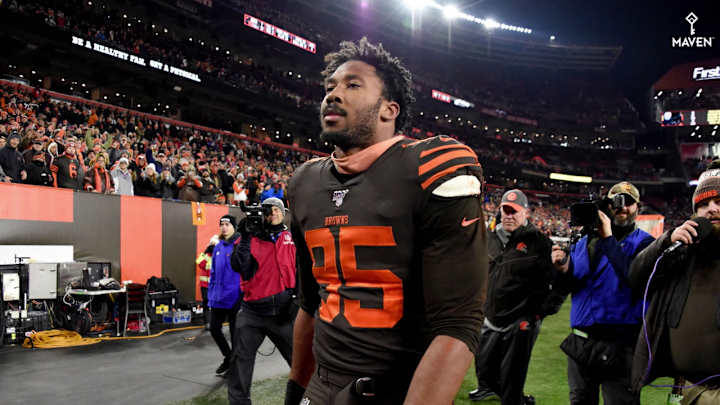Myles Garrett Doesn't Back Down From Accusations, Points Out Loose Ends In NFL's Investigation

After being reinstated by the NFL, Cleveland Browns defensive end Myles Garrett spoke to ESPN's Mina Kimes on Outside the Lines about the incident on November 14th with Pittsburgh Steelers quarterback, Mason Rudolph. Other than Garrett serving out his suspension, the story was almost over as soon as it started, despite the allegations.
Garrett did not back off his assertion that Rudolph referred him by a racial slur. Although Rudolph has not commented on this story to this point, he was adamant at the time he didn't say it. The most notable part of the interview is when Garrett talks about what he feels is a mysterious lack of audio on a nationally televised game.
Garrett tells Kimes specifically what he believes Rudolph called him, which Garrett is hesitant to even bring up. "He called me a 'stupid N-word." He's still annoyed that what he told the NFL came out, which is supposed to be a confidential process. That's just one of the numerous loose ends in this story. When Garrett met with the NFL in this case, it was out in the public sphere for everyone to consume within hours, if it even took that long.
Part of the reason Garrett was bothered by that fact, according to him, is he didn't tell the NFL what he believed happened in an attempt to justify his actions, saying there isn't one for what he did. He owned his actions from the very beginning. Garrett insists he was just trying to explain what happened that caused the situation.
Whether people choose to believe Garrett's accusations or not, the most fascinating part of the story was then and still continues to be the lack of audio to investigate Garrett's claims. Much of the reason for the suspension being six games was the fact it was a nationally televised game. Nevin Lawson of the Arizona Cardinals also hit an opponent with a helmet later in the season in a much less public game without video of the event being rolled continuously and he was suspended one game.
"Most quarterbacks wear [microphones] in their helmets. He somehow lost his helmet and had to get another one without a mike. There were guys that were mike'd up near me - near us during that time that didn't hear anything. And from what I've heard, there have been audio that could have heard or something or could not have heard something. They don't want to say. So, something was said. I know something was said. Now, whether the NFL wants to acknowledge it, that's up to them."
The point Garrett brings up regarding the NFL is just as serious and easier to believe. With all of the audio equipment, be it in helmets or on the sideline for nationally televised games, used for programming by companies like NFL Films, the teams themselves or anyone else, so much of it seems to be readily available. In this situation, the NFL would have people believe that no audio is available that could illuminate this situation.
